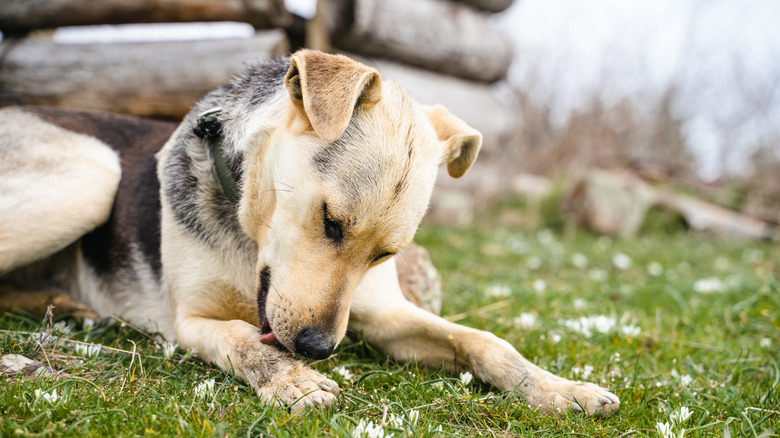How To Stop A Dog From Pulling Its Hair Out
While it's super cute when your dog whirls around in a circle and chases their tail, it isn't so cute when they pull their hair out. However, both of these are natural canine behaviors. The trick is finding out the reason why they are pulling their hair out, because this action may indicate that your dog needs medical assistance or a more stimulating daily schedule. The possible causes range from fleas and stress to an allergic reaction to medicine, food, or something else in the environment.
Insect and parasite bites in dogs
Insect bites from fleas, ticks, flies, or mosquitoes can cause your dog to chew at their fur. Unlike a body-wide itch, this will be at the site of the bite, so if you see your dog going after just one spot, this could be the reason. When a dog is chewing fur off one area of their fur, this is known as a "hot spot." Hot spots can grow and become more serious as the skin is disturbed from the repeated licking, chewing, biting, and scratching, which in turn makes your dog even more anxious to relieve their itch.
Stress and anxiety in dogs
Dogs can develop compulsive behaviors when they are stressed or anxious. If you see your dog pulling out the hair on their back, tail, paws, or other sites and there is no medical reason for it, they could be stressed or lonely and trying to soothe themselves. This may be the case if other destructive behaviors are manifesting such as chewing up objects or scratching on walls or furniture.
Allergies in dogs
A dog chewing on their hair could be the result of an allergy. Wag Walking says allergies in dogs are common, and they usually will manifest by the time they're 3-years-old. Atopic dermatitis, an itch that won't go away, is a common allergy that is known to affect certain breeds, including Shar-Peis, wirehaired fox terriers, golden retrievers, Dalmatians, boxers, Boston terriers, Labrador retrievers, Lhasa apsos, Scottish terriers, Shih Tzus, and west highland white terriers.
Seborrheic dermatitis is a similar condition in which your dog will experience an uncontrollable itch but in this case, you will likely notice a foul smell along with it. A dog chewing fur off to the point that they develop an open sore is at risk for a secondary infection if the wound is not properly taken care of. Consult your veterinarian for assistance.
Dogs chew their paws
Dogs chew their paws for many reasons including pain. Your dog may have stepped on something that poked their tender paw pads, like a thorn or sharp rock. Since dogs are on their feet at all times, it is common for them to step on a small sliver of glass or another sharp object; your dog's chewing may be an attempt to remove the foreign object or relieve the pain.
Boredom or loneliness
Dogs who chronically chew may be experiencing something more than just a typical itch. A dog chewing on their leg hair specifically could be a sign of boredom. Dogs are pack animals and feel comfortable grooming one another. If a dog repeatedly licks themselves, it could be because they lack companionship.
Treatment for dog chewing and hair pulling
The treatment for your dog's chronic chewing will be based on the cause of it. If it's a hot spot, there are sprays and creams that can be applied to the area to keep this behavior under control. If it's a boredom-related issue, hiring a dog walker or changing your schedule for more play time could be what is needed. Alternatively, if the cause is a skin condition or allergy, a medical treatment could fix things right up. Consult your veterinarian to determine the best way forward.
